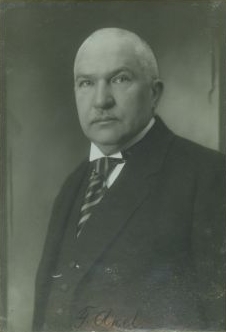Friedrich Akel
This article needs additional citations for verification. (November 2011) |
Friedrich Karl Akel | |
|---|---|
 | |
| Born | 5 September 1871 Kaubi Manor, Kaubi Parish (now in Pornuse), Viljandi County |
| Died | 3 July 1941 Tallinn |
| Cause of death | Executed by the NKVD |
| Nationality | Estonia |
| Occupation(s) | Physician Diplomat Head of state |
| Known for | Member of the International Olympic Committee |
Friedrich Karl Akel (5 September [O.S. 24 August] 1871[1] in Kaubi Manor, Kaubi Parish (now in Pornuse village, Halliste Parish) – 3 July 1941 in Tallinn) was an Estonian diplomat and politician, a member of the International Olympic Committee.,[2] and Head of State of Estonia in 1924.
Akel attended the Alexander Gymnasium in Tartu, and studied in the department of medicine of Tartu University in 1892–1897.
He was an assistant in the Tartu University Clinic, a doctor in the Reimers ophthalmology clinic in Riga, 1899–1901 a doctor in the Ujazdov hospital in Warsaw. In 1901, he studied in Berlin, Prague and Leipzig. Akel worked a private ophthalmologist in Tallinn, and in 1907 he was one of the founders of the Private Clinic of Estonian Physicians. In 1912 he founded his own eye clinic. In 1904–1905 he was in the Russo-Japanese war as a physician. He was also a member and a chairman of the Tallinn Municipal Council, and the Honorary Justice of the Peace in the Tallinn-Haapsalu Peace Council.
Akel was a member the Board of the Northern Baltic Union of Physicians and the Tallinn Popular Education society, Chairman of the sports society "Kalev", building society of "Estonia" theatre and the Estonian Society "Estonia" in Tallinn, Member and Chairman of the Council and member of the Board of the Tallinn Loan and Savings Society, later the Tallinn "Krediitpank" (Credit Bank), 1920–1922 Vice President of the Consistory of the Estonian Evangelical Lutheran Church, and in 1927–1932 Estonia's representative in the International Olympic Committee.
Akel was Estonia's Elder of State in March – December 1924, and served three times as foreign minister. He was also Estonia's envoy in Finland, Sweden and Germany. In 1923–1929, Akel was a member of the Riigikogu, and in 1938–1940 he was a member of the Riiginõukogu (the second Chamber of the Estonian Parliament).
In October 1940, Akel was imprisoned by the NKVD. He was shot to death in Tallinn on 3 July 1941. His wife, Adele Karoline Tenz, was deported in June 1941 and died in 1944.
Awards
- 1925 – Order of the Three Stars I
- 1927 – Order of the Estonian Red Cross I/II
- 1934 - Order of the Pole Star of Sweden, Grand Cross°
- 1935 – Order of the Cross of the Eagle I
- 1936 – Order of the Estonian Red Cross I/I
- 1938 – Order of the White Star I
References and sources
- References
- ^ "Friedrich Karl Akel" (PDF) (in Estonian). Government of Estonia. p. 2. Retrieved 8 June 2013.
- ^ "Karl Friedrich Akel" (PDF). LA84 Foundation. Retrieved 29 September 2008.
- Sources
- Friedrich (Karl) Akel
- Ülo Kaevats et al. 2000. Eesti Entsüklopeedia, volume 14. Tallinn: Eesti Entsüklopeediakirjastus, ISBN 978-9985-70-064-8
- Use dmy dates from August 2011
- 1871 births
- 1941 deaths
- People from Viljandi County
- People from the Governorate of Livonia
- Estonian Lutherans
- Christian People's Party (Estonia) politicians
- Heads of State of Estonia
- Ministers of Foreign Affairs of Estonia
- Government ministers of Estonia
- Members of the Riigikogu
- Members of the Riiginõukogu
- Ambassadors of Estonia to Germany
- Ambassadors of Estonia to Sweden
- Ambassadors of Estonia to Finland
- Envoys of Estonia
- Estonian physicians
- Ophthalmologists
- 20th-century Estonian people
- International Olympic Committee members
- University of Tartu alumni
- Recipients of the Military Order of the Cross of the Eagle, Class I
- Estonian people executed by firearm
- Deaths by firearm in Estonia
- Estonian people executed by the Soviet Union

